In Pictures: Tunisia’s election watchdogs
International observers help Tunisia prepare for its first democratic election in decades.
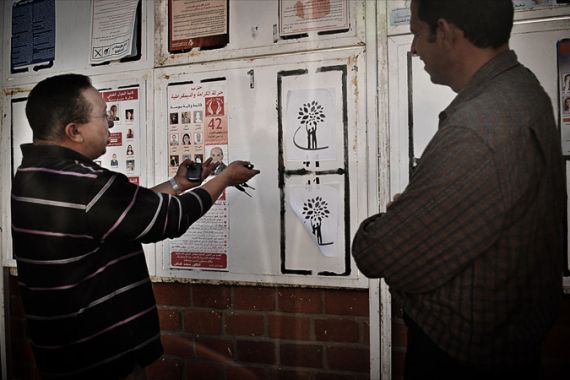
Even in the small coastal town where Tunisia’s deposed president, Zine El Abidine Ben Ali, was born, the wheels of democracy are turning.
Campaigning for the country’s first election since the authoritarian regime fell under pressure from rolling protests officially began on October 1.
Parties in this part of the North African country have taken a timid approach to the campaign so far, but things are heating up as the big day draws closer.
Al Jazeera spent a day with international observers and Tunisian election authorities in the towns of Hammam Sousse, Sousse and Monastir, as they prepare for the October 23 election that many Tunisians hope will usher in an era of transparency and democracy.
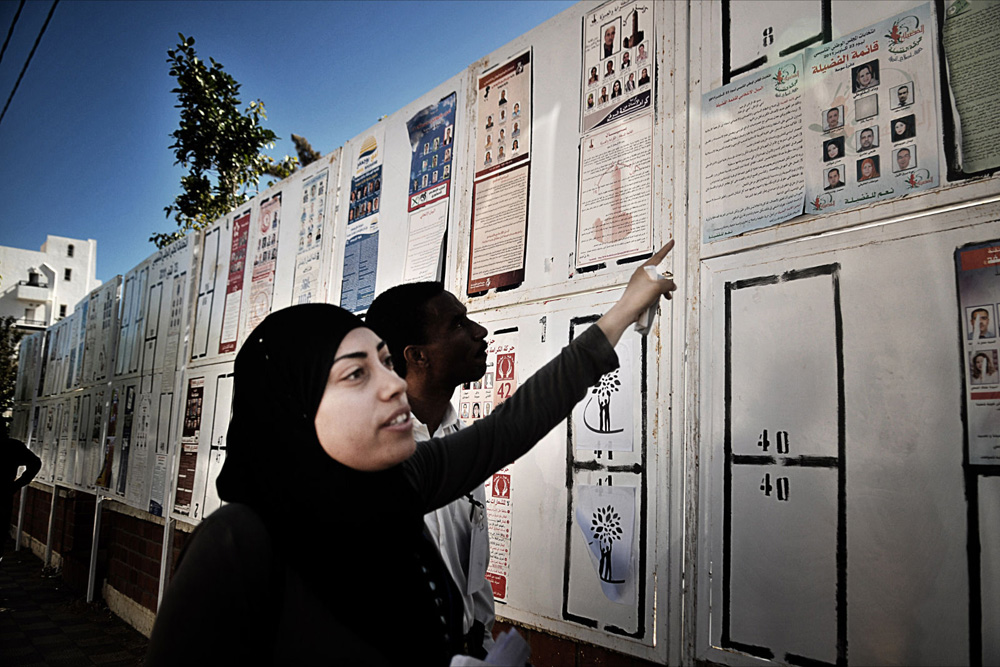 |
| Fatherrahman Yousif, left, an observer for the Carter Centre, examines campaign posters with Mariem Ben Moussa, right, a local volunteer [Credit: Aude Osnowycz] |
Mariem Ben Moussa is a local member of the Independent Regional Authorities for the Elections (IRIE by its French acronym). She worked as an information technology teacher until she became unemployed four years ago.
Since July, she has been an active member of the IRIE, taking charge of voter registration and going out to rural areas to give Tunisians the chance to enrol on the election lists.
“The campaign is going very well, besides some minor infractions,” she says.
There are 33 branches of the IRIE, which fall under the authority of the Tunisian Higher Election Authority (ISIE), an independent body overseeing the constituent assembly election at the national level.
 |
| Mariem Ben Moussa and the Carter Centre’s Renate Herrmanns talk in Hammam Sousse [Credit: Aude Osnowycz] |
“We try to go to a different governorate every day to talk to the people involved and see how the process is running there,” Herrmanns says, who, along with her colleague Fatherrahman Yousif, is tasked with monitoring the electoral process is the governorates of Sousse, Monastir, Kairouan, Mahdia and Zaghouan.
“Our day-to-day business is going to an area, meeting with the IRIE, meeting political parties and those independent lists, we go and visit the local units of the IRIE and see how they’re doing in preparing for the vote.”
“We also speak to normal people and ask how they view the campaign.”
The Carter Center was invited to observe the election by the ISIE early in the year. The NGO has sent ten long-term observers, including Herrmanns and Yousif. They will be joined by another 40 short-term observers closer to election day.
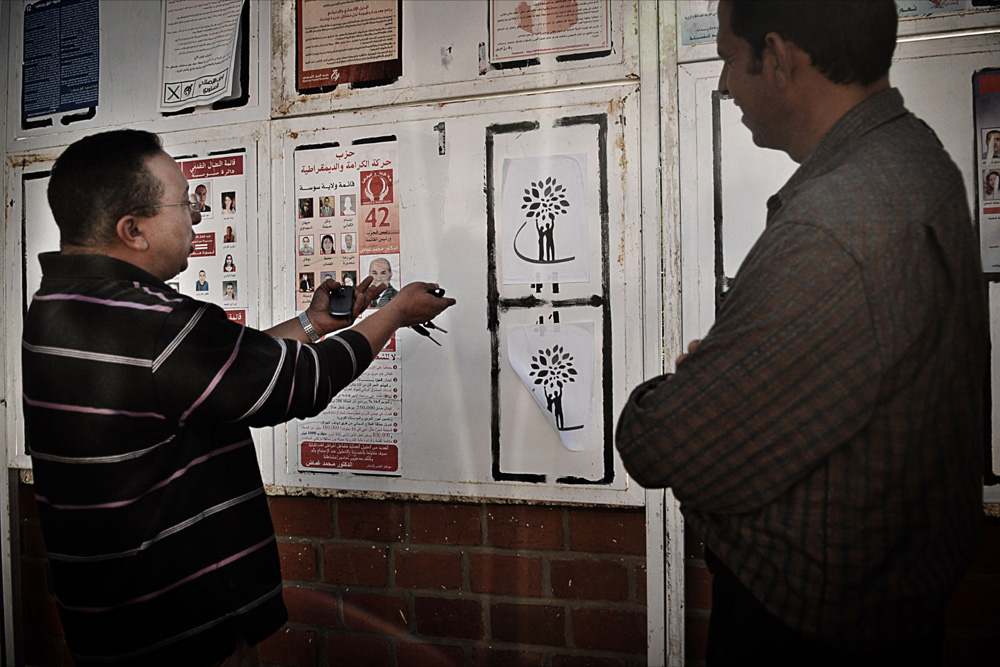 |
| There are strict rules on where political parties can post their propaganda [Credit: Aude Osnowycz] |
In Hammam Sousse, twelve public spaces have been delegated for campaign posters. At each location, parties were allotted specific spaces by lottery.
Mourad Ben Massaouda, a local man, has been watching this wall with interest as the poster began appearing after October 1.
The Progressive Democratic Party (PDP) was the first to, followed by the Tunisian Workers Communist Party (PCOT) and then al-Nahda. Many other spaces remain empty, and he wonders why the rest of the parties are not taking the opportunity to display their lists.
“How come so many parties haven’t put up their posters yet?” he asks.
Others have put up material that offers little useful information for voters.
“They haven’t written the party’s name or the programme, just the logo!” he says, puzzling over a poster that shows a tree without any text.
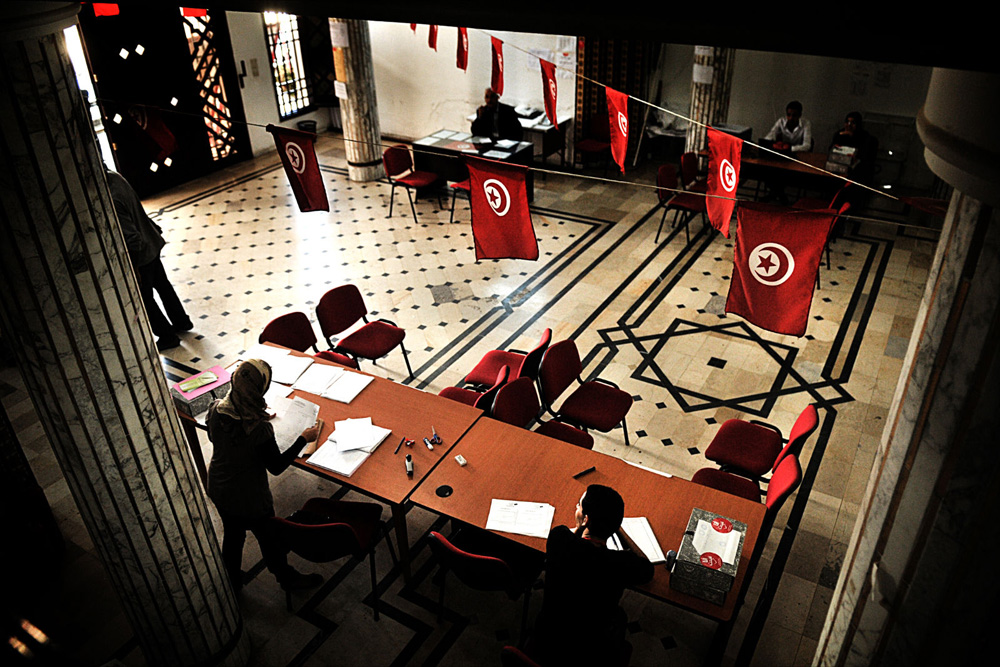 |
| In the town of Sousse, the IRIE has symbolically taken over what used to be the local office of Ben Ali’s now-disbanded political party [Credit: Aude Osnowycz] |
Voluntary voter registrations in July and August were second-highest in the country in the Sousse area, at 62 per cent.
For Ynes Grijem, a member of the IRIE for Sousse, this was largely achieved because of the legwork put in by electoral volunteers.
“We went out into the rural areas to speak with people, because there are many psychological obstacles,” she says. “People didn’t understand what this is about, they were used to a caricature of democracy and, in a way, they thought it would continue in the same way.”
 |
| Until January, the hall where the people of Sousse will cast their votes on October 23 was dominated by a massive portrait of Ben Ali [Credit: Aude Osnowycz] |
Its walls were painted in purple, the former president’s fetish colour.
“We lived in a country monochrome, where only one colour was allowed. There was no diversity, it was even a dictatorship even when it came to the colour scheme,” Ynes Grijem explains. “We’ve made an effort to redecorate.”
 |
| The ISIE has made an effort to recruit young people into the electoral process [Credit: Aude Osnowycz] |
The national unemployment agency offered the posts to unemployed university graduates. Initially the positions were voluntary, but the authorities now give these IRIE staff $318 a month for their efforts.
The majority of the electoral staff in IRIE’s across Tunisia are young women, reflecting the fact that Tunisian women are more likely to have university degrees – a requirement for the IRIE positions – than men.
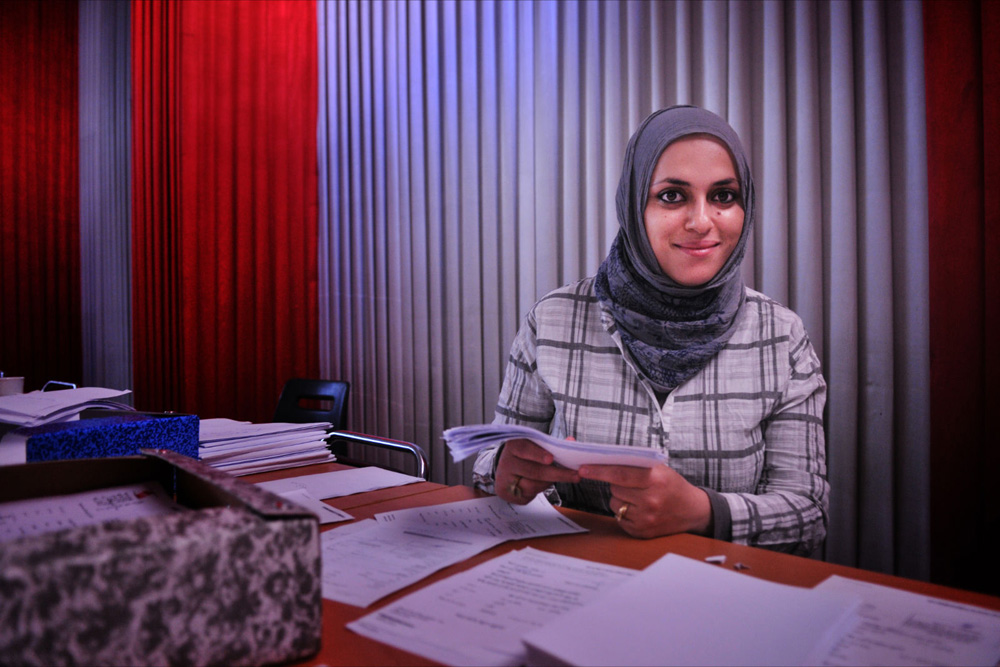 |
| Soumaya Bouhaouel, a 29-year-old with a degree in law, has been working at the IRIE since mid-July [Credit: Aude Osnowycz] |
“It’s the first time that young independent people can participate in elections. I’ve never been interested in politics until now. Our goal is to make these elections work,” Bouhaouel says.
 |
| Jamal M’Sellem, head of the Sousse branch of the Tunisian Human Rights League, says he has joined the IRIE to do his part to help democracy [Credit: Aude Osnowycz] |
He says that many members of civil society have risen to the occasion, despite their lack of experience in coordinating elections.
“Tunisia has suffered from dictatorship and despotism for decades, and the democratic transition is not easy. We must do everything to ensure that these elections are a success.”
“The members of the electoral authorities have no background in the electoral process, because [under the former regime] we were kept far away from the previous elections, where fraud was massive.”
 |
| In Monastir, volunteers will be charged with observing the voting booths on election day and counting ballots [Credit: Aude Osnowycz] |
Volunteers come to the centre to learn about what their duties will be on the big day. Anais Khalfallah, a member of the IRIE for Monastir, says they received 1,700 applications from locals wanting to participate.
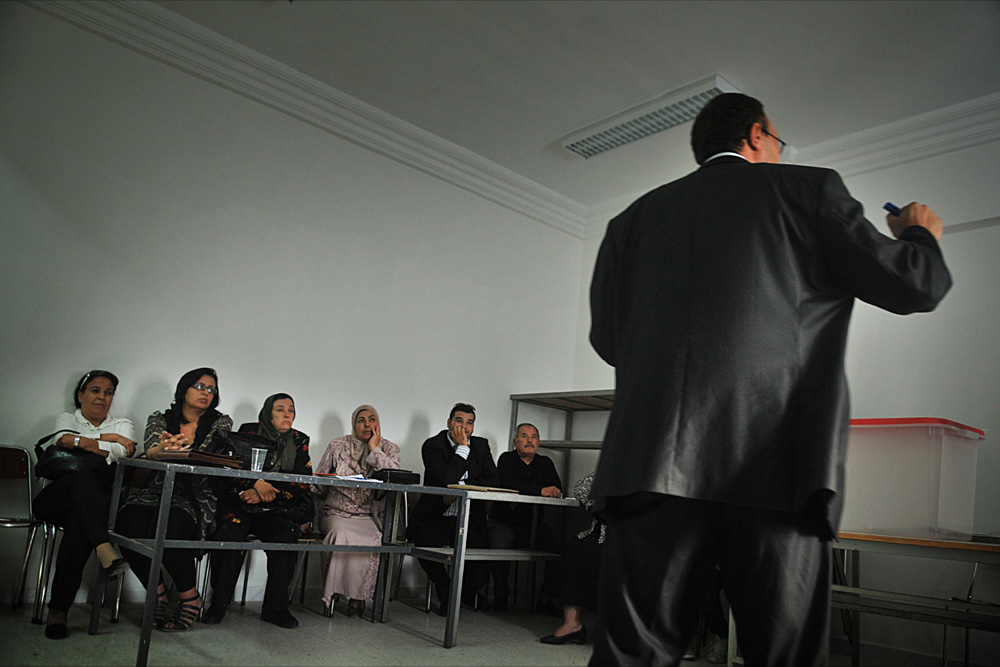 |
|
Each day, 175 of volunteers come to this training centre [Credit: Aude Osnowycz] |
Three-quarters of the day is spent doing practical exercises on preparation, monitoring the voting booths and vote counting.
They must sign a declaration affirming that they are not linked to any political party.
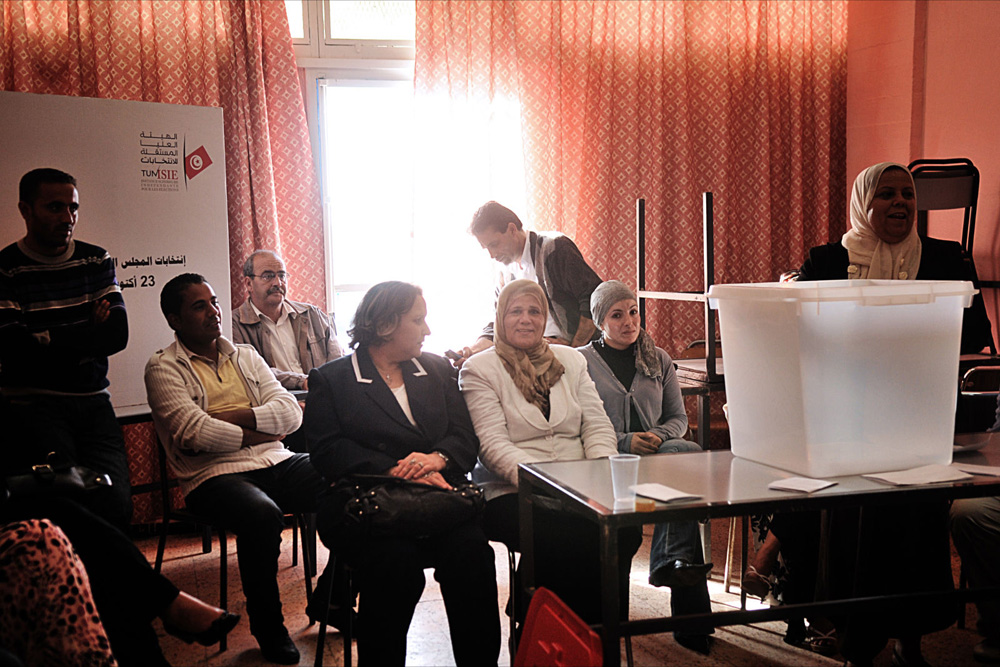 |
| Jamila, centre, was one of the students at the training when Al Jazeera visited this week [Credit: Aude Osnowycz] |
“I want to help make democracy a reality in Tunisia,” she says. “We are proud to be part of this.”
The primary school teacher says she was an election monitor in elections under the former regime, but hopes this time around it will be different.
“I participated under the ex-president, only this time, I hope it will be genuine.”